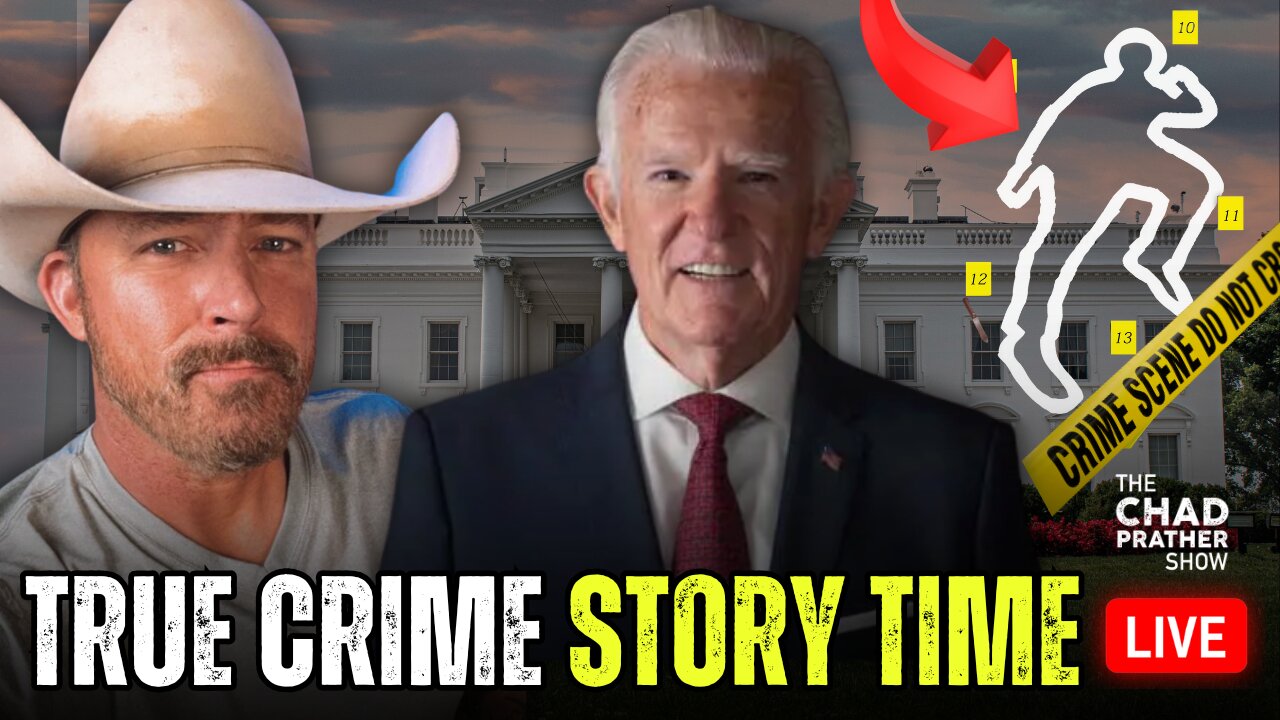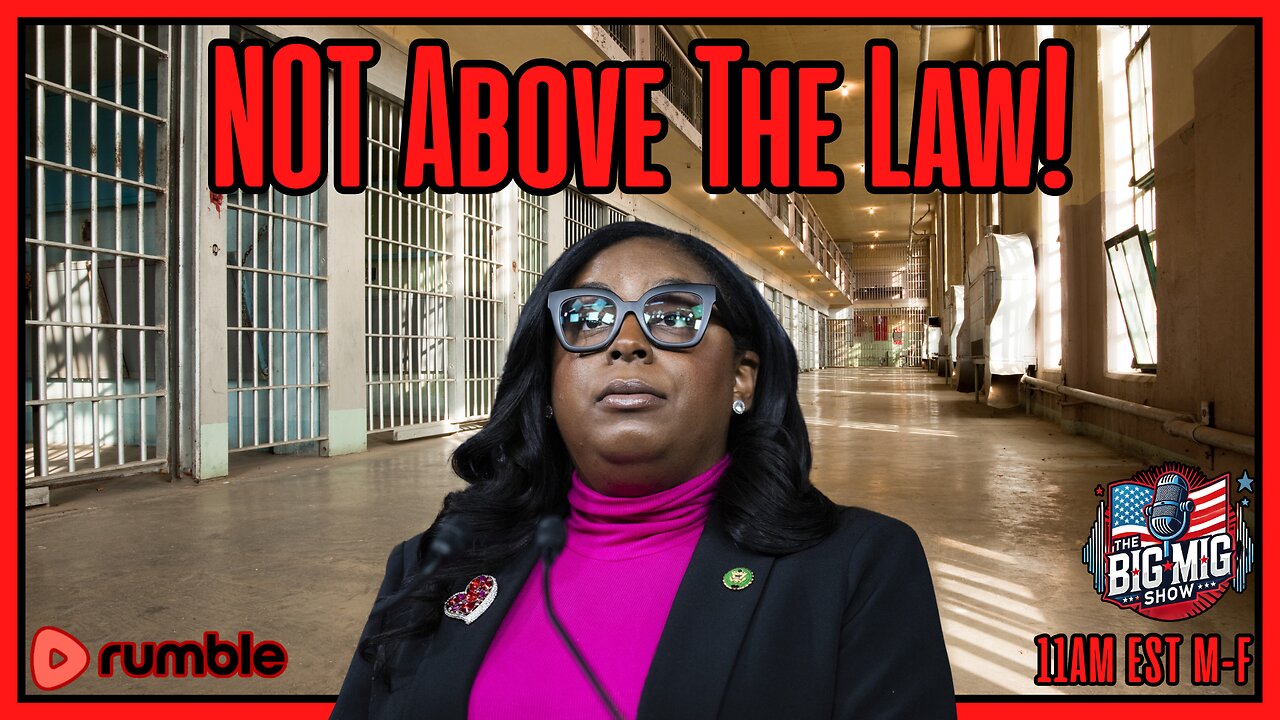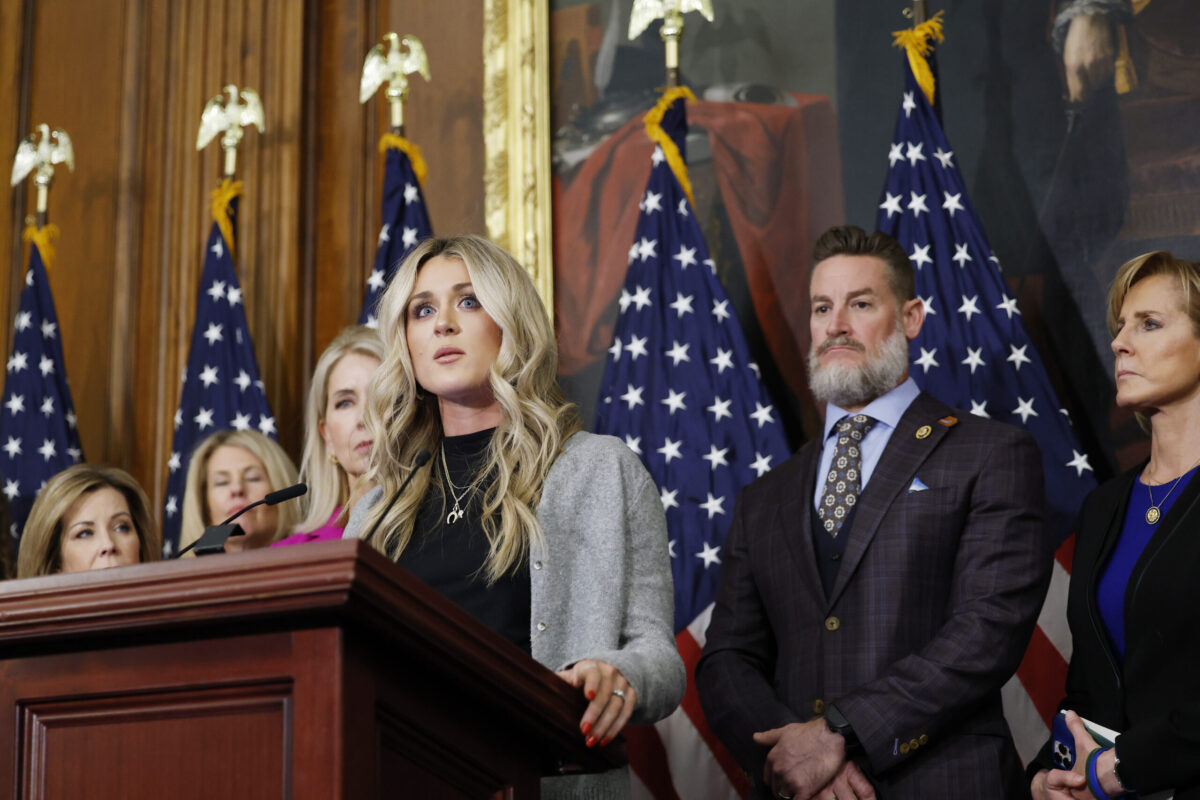‘A Very Consequential Precedent’: AG Skrmetti Unpacks Landmark Supreme Court Case
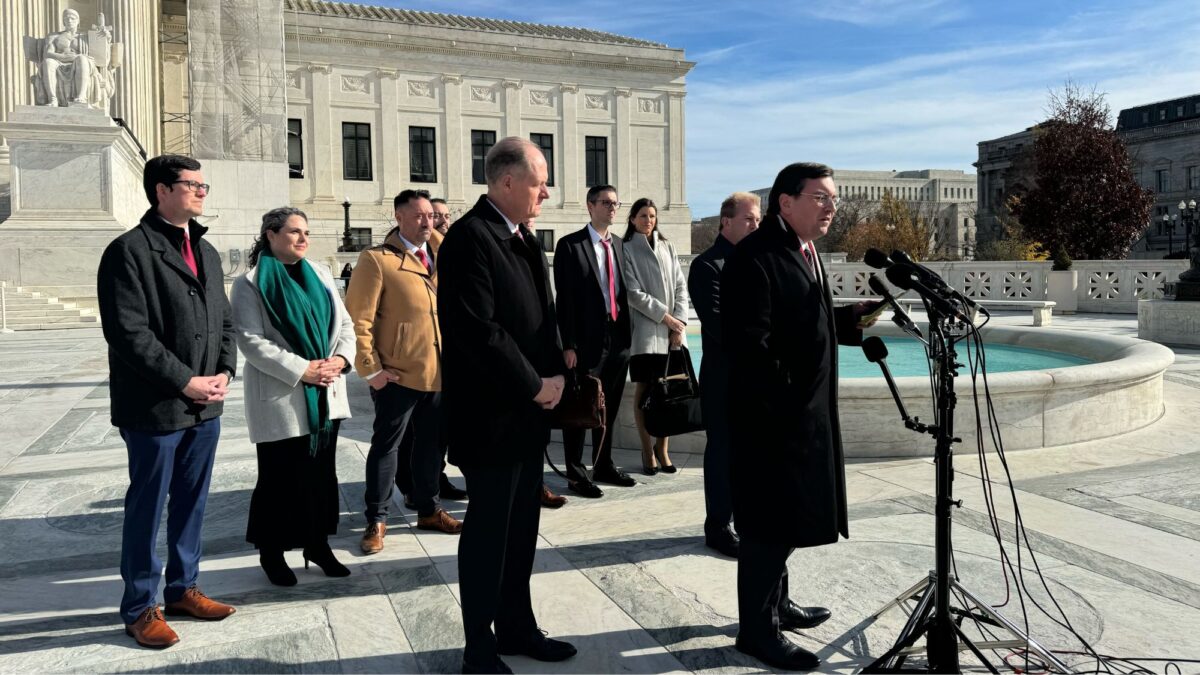
The following is an edited transcript of an interview between Daily Wire Editor-in-Chief John Bickley and Tennessee Attorney General John Skrmetti on a Saturday edition of Morning Wire.
It’s being called the most significant case of the current Supreme Court term — United States v. Skrmetti. The attorney general sat down with us to discuss his pivotal role in the case and his defense of a state law aimed at protecting minors from transgender medical procedures.
* * *
JOHN: Joining us now is Tennessee’s Attorney General Jonathan Skrmetti. Attorney General, thank you so much for coming on. The Supreme Court heard oral arguments Wednesday on what is setting up to be a landmark case on transgender medical procedures on minors. Your name is on this marquee case, it’s you against the federal government: United States v. Skrmetti. So, safe to say, no one is more attuned to what happened this week than you. First, how do you feel the day went for your case?
SKRMETTI: I thought it went very well. I can’t predict outcomes, you don’t know what the court’s going to do and the justices have months to deliberate. So without talking “horse race” here, I thought the day went well for us. My solicitor general Matt Rice did a great job making our case. I was very happy with his oral argument. The argument went long, which I think reflects that the justices care a lot about this, recognize there are some complexities here from a legal perspective, and that this could be a very consequential precedent. And so they want to get it right. So I thought they explored many issues very thoroughly, and I thought we put out a great case for Tennessee.
JOHN: Yeah, what were some of the questions from the justices that stuck out to you, that could be key in their decision-making?
SKRMETTI: Again, you don’t want to prognosticate too much, but I think the sex discrimination questions were very important. There was one lengthy line of questioning, but there were a number of questions about how this case might fit into existing sex discrimination case law. And I think that’s probably going to be a very significant issue for the outcome of the case. I think I can prognosticate that much. But the question is: Is this a sex discrimination case in a constitutional sense? Our position is, it is not, because you’re not treating like people differently. The argument is because boys can get testosterone, but girls can’t, and girls can get estrogen, but boys can’t, that you’re discriminating on the basis of sex. But our position is there’s not some universal distribution of hormones out there. You don’t just give boys testosterone. Anytime a drug is prescribed, it is for the purpose of treating a particular condition. And the evaluation of whether the drug is appropriate depends on that condition. There’s not some universal access to any given drug. So, if you’re giving a boy testosterone, for a testosterone deficiency, that’s relieving medical problems. That’s curing harms. If you give a girl testosterone for a psychological condition, gender dysphoria, it will create a host of physiological problems – potential lifelong loss of fertility, potential lifelong loss of sexual function. Depending on which hormone you’re talking about, you can have lifelong problems with blood clots, with tumors, with puberty blockers, bone density disorders, and all of them cause potential lifelong cognitive impairments. So the use of the drug is very contingent on which condition you’re addressing with it.
JOHN: Part of this is encapsulated in the concept of off-label usage of drugs. Can you explain what that means for our audience?
SKRMETTI: Sure. So the FDA, kind of adopting the perspective that I just articulated, only evaluates drugs for certain uses. They don’t say, “This drug is good, everybody can get as much of it as they want.” They say, “This drug is appropriate for treating this condition.” So, a lot of times, a drug will be approved to treat certain conditions. The FDA doesn’t have sufficient research to evaluate whether it’s appropriate for other conditions, but doctors can still sometimes prescribe it. They can prescribe off-label, which means even though the drug is not approved for that use, the doctors have made an informed medical decision to use it in that context, but they’re still subject to regulation. The state has, for hundreds of years, been regulating the practice of medicine. Even though doctors have a great deal of latitude, there are legal limits on what they can do. Oftentimes those limits are in place because the potential harms dramatically outweigh the potential benefits. The state has made a judgment that it is simply not appropriate to let doctors do what they would otherwise be inclined to do. Of course, those are fairly limited circumstances. We give a lot of latitude to doctors. We have a lot of respect for their training and for their decision-making, but there’s still a role for regulation there.
JOHN: When your team researched the evidence, the medical justification for why you think this is a fair law in the first place, what did you find in terms of the efficacy of these gender transition procedures for minors? Is there evidence backing up what pro-trans activists will claim about this?
SKRMETTI: Every systematic review of the evidence has determined that there is little to no benefit to minors. There are individual studies – there was some of this in the court. You can attack any given individual study on either side, there are always arguments to be made, but the systematic reviews of the overall research literature have consistently shown no benefit to minors. That’s why European countries that pioneered the use of these procedures on kids have since reversed course. It’s not because they suddenly got very politically conservative. It’s because they looked at the evidence and they determined that, for kids, the risks far outweigh the benefits, that the unexplained dramatic increase in the number of cases was very concerning, that there simply wasn’t a medical justification for the broad adoption of these treatments in the juvenile context. So they’ve greatly restricted the availability of these treatments. And that same review of evidence informed Tennessee’s decision.
JOHN: Now, I wanted to ask you about the parental rights aspects of this law. The pro-trans activists have tried to argue that Tennessee’s law could violate parent’s rights. What do you make of that argument?
SKRMETTI: So when the case was originally filed, there was both the constitutional argument, involving sex discrimination, and a parental rights argument. We won both in the Court of Appeals in the Sixth Circuit. The United States only petitioned for cert on the 14th Amendment issue, and so when the court granted that petition, the only question before them is the equal protection sex discrimination claim. So, the parental rights issue is still lurking out there. Justice Barrett addressed that briefly. Now, there are other situations where parents aren’t allowed to do what they’d otherwise be inclined to do. We give parents a great deal of latitude with their children but that doesn’t mean that they can do whatever they want, particularly in situations where you’re talking about severely adverse consequences in the long run. Parents can’t just go ahead and let their kids engage in conduct like that because the kids can’t meaningfully consent, and the parents can’t consign them to a life of dealing with the consequences for many, many different choices. This is an area where the state’s power is near its apex, protecting kids from serious harm.
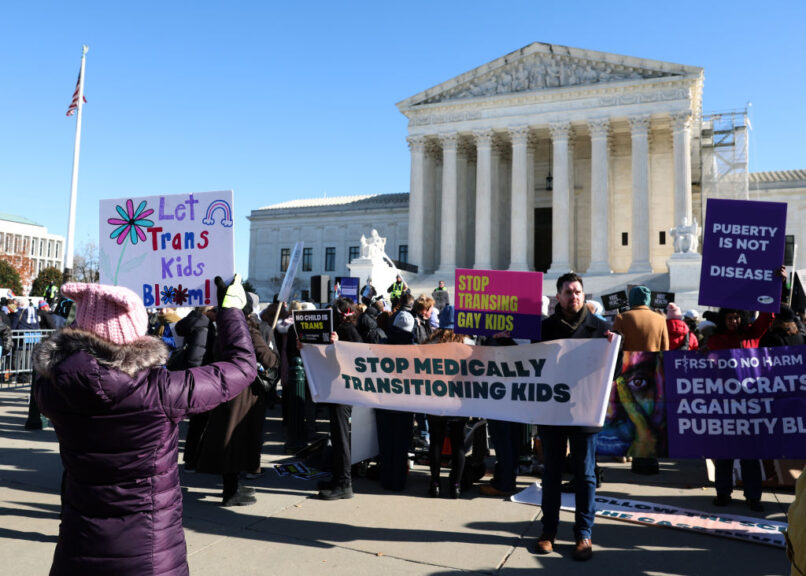
Credit: Photo by Kevin Dietsch/Getty Images.
JOHN: Now, as we’ve documented here at the Daily Wire, Tennessee’s law was inspired by an investigation into Vanderbilt’s gender clinic by Matt Walsh that got the attention of a lot of people not just in the state but across the country. And now over two dozen states have laws similar to Tennessee’s How will this ruling of impact those state laws?
SKRMETTI: Well, presumably if Tennessee’s law is constitutionally sound, then the other half of the states in the country that have adopted similar laws will similarly survive constitutional scrutiny, and it will allow those states to exercise their sovereign authority to regulate the medical profession in a way that protects kids. So, this is definitely a case that will have broader consequences than just within the borders of Tennessee.
JOHN: A larger question, about the cultural context of this: We just saw an election where Republicans gained 10 points or more in almost every single state, even in very deep blue areas – even if they didn’t vote for Trump, they moved in the direction of Republicans. And one of the most cited issues was the transgender agenda. Do you see this year as a turning point on this issue?
SKRMETTI: So I think it’s an issue that’s front of mind for a lot of people because the country has moved, at least in part, very, very far, very, very fast over the past few years. We’ve just seen radical changes in the rhetoric, in mainstream conversations about gender identity. To tell someone 10 years ago this would be the big case of this term at the Supreme Court, I think, would have baffled most Americans. So it’s something that people are reacting to. But I do think, even if there is a political element to it with respect to the election, it’s really important to note that this is not a political issue for a lot of people. This was a bipartisan piece of legislation. It was supported by members of both sides of the aisle when it came through the Tennessee legislature. The people advocating for this include, of course, traditional Christian conservative groups, traditional constitutional conservative groups, but also groups that probably don’t align with us on a lot of issues. There are medical groups that are fairly non-political. There are LGB groups that are very concerned about what they term “transing the gays.” So this is a coalition that’s much broader than just one side of the political divide. There are a lot of people who are really worried that we have adopted an approach to gender identity issues that’s going to leave a lot of kids very hurt.
JOHN: There’s certainly evidence that the national sentiment has shifted on this. Final question. The justices will deliver their decision this summer. In the meantime, how does Tennessee handle this particular law in the intervening months?
SKRMETTI: So, our law is currently in effect, and we will enforce it. That means we’re going to be protecting Tennessee kids from these lifelong treatments. One important fact is, the science shows, the evidence shows most kids dealing with gender dysphoria will outgrow it. It’s a hard thing to deal with, it’s a hard thing for everybody to deal with, but most of these kids who are being steered toward these life-altering treatments would be fine if they were just given time – and we want to make sure they have that time.
JOHN: Well, attorney general, thank you so much for taking the time to talk to us.
SKRMETTI: Thank you. Take care.
JOHN: That was Tennessee Attorney General Jonathan Skrmetti and this has been a Saturday edition of Morning Wire.
***
CHECK OUT THE DAILY WIRE HOLIDAY GIFT GUIDE
Originally Published at Daily Wire, Daily Signal, or The Blaze
What's Your Reaction?
 Like
0
Like
0
 Dislike
0
Dislike
0
 Love
0
Love
0
 Funny
0
Funny
0
 Angry
0
Angry
0
 Sad
0
Sad
0
 Wow
0
Wow
0









